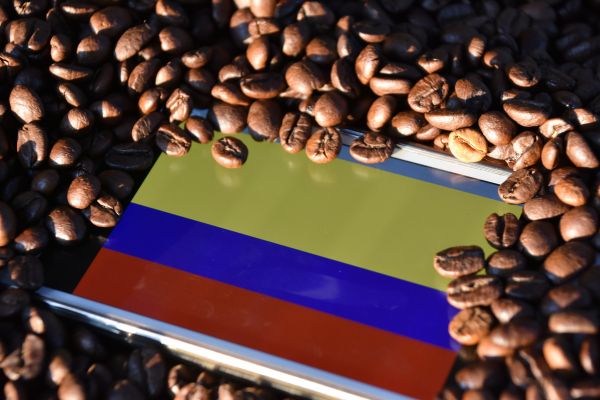A cup of Colombian coffee symbolizes more than just a caffeine fix. It encapsulates a story of rich traditions, relentless hard work, and an unwavering commitment to quality that has made Colombia one of the world’s leading coffee producers. When we think of coffee, the scenic coffee plantations sprawling across the lush green landscapes of Colombia come to mind. Behind each cup of coffee, there lies a narrative of flavor, culture, and effort that is quintessentially Colombian.
Colombia: A Perfect Environment for Coffee
Colombia’s unique geographical position and climate make it an ideal location for coffee cultivation. Nestled between two mountain ranges, the Colombian Andean region offers fertile volcanic soil and stable temperatures, essential for coffee growth. Furthermore, the two rainy seasons in the country ensure a continual harvest, leading to fresh coffee availability all year round.
The altitude at which Colombian coffee is grown contributes significantly to the quality of the coffee. Ranging between 1,200 and 1,800 meters, the high-altitude conditions slow the development of the coffee cherries, leading to denser beans and a deeper, more nuanced flavor profile. This slower growth rate allows for the cultivation of high-quality Arabica beans, which are renowned for their smooth, rich, and full-bodied flavor.
Colombia’s biodiversity also plays a pivotal role in its coffee production. The country’s diverse ecosystems provide the perfect habitat for different varieties of the Coffea plant, resulting in an array of distinct regional flavors. This biodiversity, coupled with the traditional farming methods used, makes each cup of Colombian coffee a unique experience.
Colombian Coffee: A Labor of Love
Producing coffee in Colombia is a labor-intensive process that requires immense effort and dedication. The coffee plants demand constant care and attention, from planting to picking. Each stage of the process, from selecting and planting the coffee seeds, to caring for the coffee trees, to hand-picking the ripe coffee cherries, is carried out manually, often by families who have cultivated coffee for generations.
Hand-picking the coffee cherries is an arduous task that requires precision and care. Pickers must ensure that only the ripe cherries are harvested, leaving the unripe ones for a later harvest. This selective picking process, while time-consuming, ensures that only the best coffee cherries are chosen, contributing to the high quality of Colombian coffee.
After the cherries are picked, they undergo processing and drying. The beans are then carefully sorted by size and color to ensure uniformity. Following this, the coffee is roasted to perfection, a process that requires a keen understanding of the coffee’s characteristics and precise control over the roasting conditions.
The Journey of Coffee: From the Farm to the Cup
The journey of coffee from the farm to the cup is a long and complex one. It begins at the coffee farm, where the coffee cherries are carefully nurtured and harvested. Once the coffee cherries are picked and processed, they are sent to be sorted, packaged, and exported.
The process of getting coffee from the farms to the consumers involves a variety of intermediaries, including exporters, importers, roasters, and retailers. Despite the long supply chain, Colombian coffee producers have managed to maintain a consistent level of quality, making Colombian coffee highly sought after around the world.
Before reaching consumers, the coffee undergoes several quality checks to ensure it meets the high standards set by the Colombian Coffee Growers Federation. These checks ensure that only the best quality coffee is exported and enjoyed by consumers worldwide.
Finally, the coffee reaches the consumer, who can enjoy the rich and complex flavors of Colombian coffee in the comfort of their homes. Despite the long journey, the aroma and flavor of the coffee remain intact, allowing the consumer to experience a taste of Colombia’s coffee culture in every cup.
Colombia’s Coffee Regions and their Unique Flavors
Colombia’s coffee growing regions each have unique flavor profiles, thanks to the country’s diverse climate and topography. The three main coffee-growing regions in Colombia are the Central Region, Eastern Region, and Western Region.
The Central Region, also known as the Coffee Triangle, is the largest coffee-growing region in Colombia. It is known for producing coffee with a well-balanced flavor profile, with a smooth body and a crisp acidity. The Eastern Region, particularly the area surrounding the city of Bogota, is known for its mild and sweet coffee with fruity notes. The Western Region, where the coffee is grown in the shadow of the Andes, produces coffee with a full body and bright acidity, often with caramel and chocolate notes.
Each of these regions has its unique growing conditions, and the differences in altitude, temperature, and rainfall between these regions result in distinct flavor profiles. These regional differences allow for a variety of taste experiences within Colombian coffee, making it a favorite among coffee connoisseurs.
The Impact of Coffee on Colombia’s Economy
Coffee has played a significant role in shaping Colombia’s economy. It is one of the country’s largest exports and plays a crucial role in providing employment. The coffee sector employs millions of Colombians, from coffee farmers and pickers to those involved in processing, packaging, and exporting the coffee.
The coffee industry also contributes significantly to Colombia’s rural economy. Most of Colombia’s coffee farms are small, family-owned operations. These small-scale farmers rely heavily on coffee production for their livelihoods, and the income they earn from coffee helps to support local communities and economies.
Despite the challenges faced by the coffee industry, such as fluctuating coffee prices and the impacts of climate change, the Colombian government and various organizations have implemented measures to support coffee farmers and ensure the sustainability of the industry. These efforts have helped to stabilize the industry and maintain the high quality of Colombian coffee.
Coffee and Colombian Culture
Coffee is deeply intertwined with Colombian culture and forms an integral part of the country’s identity. It’s not just seen as a crop or a beverage, but as a symbol of Colombian resilience, hard work, and dedication to quality. The coffee culture in Colombia goes beyond the act of drinking coffee; it represents the country’s history, its people, and its commitment to preserving its rich coffee heritage.
In Colombia, coffee is often consumed in small quantities throughout the day, either black or with a touch of sugar. This tradition reflects the simple yet profound appreciation Colombians have for their coffee. The act of drinking coffee is often a communal one, with people gathering in local cafeterias or at home to enjoy a cup of coffee while engaging in conversation.
Furthermore, coffee is celebrated through various festivals and events in Colombia, such as the National Coffee Cultural Festival. These celebrations highlight the importance of coffee to Colombia’s cultural heritage and provide an opportunity to celebrate the hard work and dedication of the country’s coffee farmers.
Colombian Coffee: A Commitment to Sustainability
Colombia’s coffee industry has demonstrated a strong commitment to sustainability. The Colombian Coffee Growers Federation (FNC) has implemented a number of initiatives aimed at promoting sustainable coffee production. These include providing training and resources to coffee farmers to help them adopt sustainable farming practices, as well as implementing measures to reduce the environmental impact of coffee production.
One of the key ways in which Colombian coffee farmers are promoting sustainability is through the use of shade-grown coffee farming. This method involves growing coffee plants under a canopy of trees, which not only helps to preserve biodiversity but also improves the quality of the coffee.
The FNC has also implemented measures to support coffee farmers and ensure their well-being. These include providing social and economic support to coffee farmers, promoting fair trade practices, and working to ensure that farmers receive a fair price for their coffee.
Colombian Coffee and Global Recognition
Colombian coffee enjoys a global reputation for its exceptional quality and unique flavor profiles. It is exported to many countries around the world, and Colombian coffee beans are highly sought after by coffee roasters and coffee lovers alike.
The recognition of Colombian coffee on the global stage is a testament to the hard work and dedication of Colombian coffee farmers. Despite facing challenges such as fluctuating coffee prices and the impacts of climate change, they have remained committed to maintaining the high quality of their coffee.
Colombian coffee’s global reputation is also bolstered by the work of the Colombian Coffee Growers Federation, which has worked tirelessly to promote Colombian coffee internationally and ensure that Colombian coffee farmers receive a fair price for their coffee.
The Future of Colombian Coffee
The future of Colombian coffee looks promising, thanks to the dedication and resilience of the Colombian coffee growers and the strong support from the government and the Colombian Coffee Growers Federation. Despite the challenges faced by the industry, efforts are being made to ensure its sustainability and the continued production of high-quality coffee.
The coffee industry in Colombia is also embracing innovation and new technology. From using drones to monitor coffee crops to experimenting with different coffee varieties and brewing techniques, Colombian coffee producers are constantly seeking ways to improve their coffee and adapt to changing conditions.
At the same time, efforts are being made to preserve Colombia’s coffee heritage and ensure that traditional coffee farming methods are not lost. This includes providing education and training to young coffee farmers and promoting the consumption of Colombian coffee both locally and internationally.
Appreciating Colombian Coffee
Appreciating Colombian coffee means understanding the effort and dedication that goes into each cup. From the farmers who painstakingly tend to their crops, to the pickers who hand-harvest each coffee cherry, to the roasters who expertly develop the beans’ flavors, Colombian coffee is the result of countless hours of hard work and a deep love for coffee.
When we drink Colombian coffee, we are not just enjoying a beverage. We are partaking in a centuries-old tradition, savoring the fruit of an artisanal process, and experiencing the rich and diverse flavors that are a testament to Colombia’s unique coffee-growing conditions.
More than just a caffeine fix, each cup of Colombian coffee invites us to slow down and appreciate the simple pleasures of life. It tells a story of a country’s love for coffee, a narrative that is deeply rooted in its culture, history, and people.
Conclusion
Colombian coffee is more than a commodity; it is a cultural icon, a symbol of national identity, and a testament to a country’s dedication to quality and sustainability. The story of Colombian coffee is one of passion, resilience, and a constant pursuit of excellence. It speaks of the indomitable spirit of the Colombian people who, despite the challenges, have managed to produce coffee that is loved and respected all over the world.
The richness of Colombian coffee extends beyond its taste. It is mirrored in the country’s diverse landscapes, echoed in the hard work of its coffee growers, and celebrated in every cup consumed around the globe. The story of Colombian coffee is truly a tale of flavor and effort, one that continues to inspire and delight coffee lovers worldwide.
So, the next time you find yourself savoring a cup of Colombian coffee, remember the journey it took to reach your cup. Let its taste tell you the story of the rich Colombian soil, the dedicated hands that tended it, and the country’s unyielding commitment to producing coffee of the highest quality. Because to truly appreciate Colombian coffee is to understand its roots and the immense effort it takes to transform the humble coffee cherry into the delicious brew that we all love.



